‘Dear Alisher Usmanov…’
TWO WORDS FOR A BILLIONAIRE RUSSIAN WHO OWNS A THIRD OF ARSENAL FOOTBALL CLUB
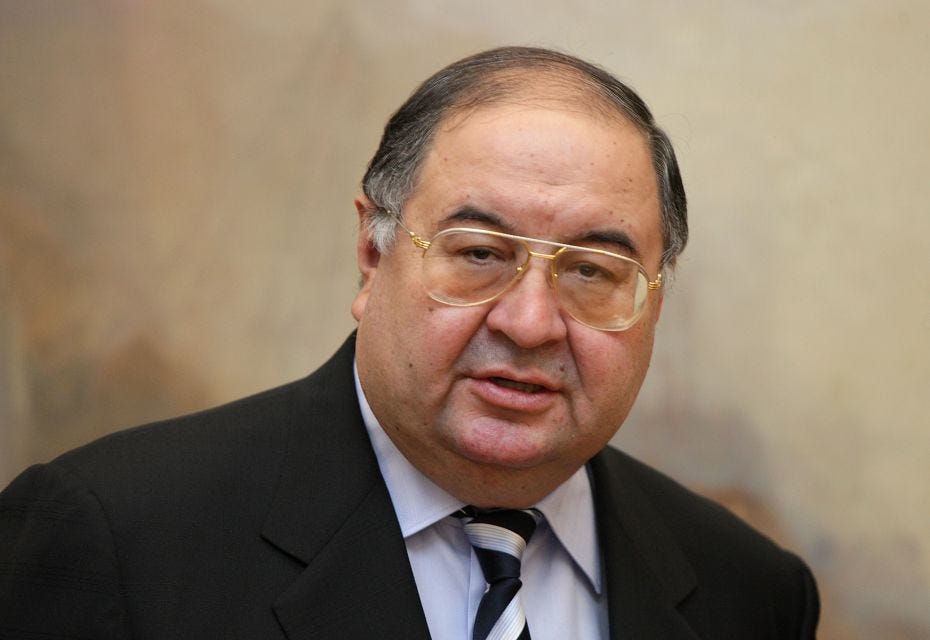
You probably don’t remember me but you might remember something I told you. It was just two words and you repeated them to me, when we met briefly, the other night, outside the Stade Louis II stadium in Monaco.
As I was leaving the match, slightly forlorn that Arsenal had gone out of the Champions League on goal difference, I did a double take. Was that you, standing there, surrounded by your retinue ? Of course it was you, probably waiting for a car to take you back to your boat in the harbour.
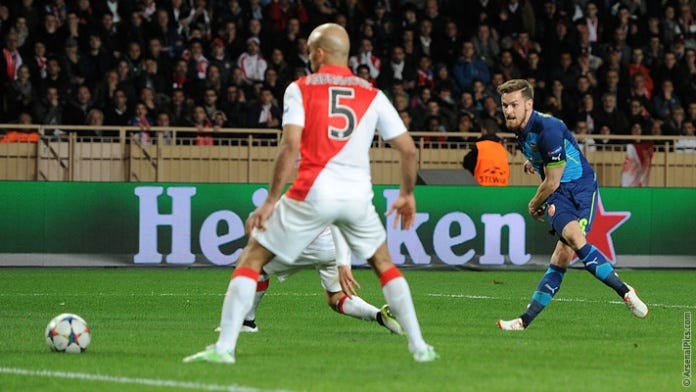
‘Was this destiny?’ I asked myself and without waiting for myself to answer, it dawned on me that even though Arsenal would not win the Champions League this season, maybe tonight could deliver a good result after all. At least for the hundreds of low paid staff contracted to Arsenal as waiters, bar staff or cleaners at the Emirates.
The thing is Mr Usmanov, I’ve been banging on about this to the club for ages but no-one bothers to reply.
I wrote to Ivan Gazidis. No reply.
I wrote to Arsene Wenger. No reply.
I wrote to Alexis Sanchez. First in English. Then in Spanish.
No reply.
First in in English. Then in Spanish.
But walking past you I suddenly saw that your one third ownership of Arsenal Football Club could make you the man to herald a small revolution at the club.
Few people would guess that you were once an accomplished fencer in the Uzbekistan national team, but that will not be how history remembers you. More likely you will be remembered as someone worth $15billion, the richest of all the rich Russians and second richest man in Britain. Dilmar alone, your boat, named after your mum, is worth some £110m and needs 47 staff to look after it.
Dilmar signals your status as a global player of power and influence and that’s why I decided to cautiously approach your ring of handsome minders and indicate I’d like a quick word. Our conversation, if you remember, (granted the dialogue was mainly from my side) went something like this.
‘Mr Usmanov, very glad to meet you, (perhaps we shook hands at this point, I can’t remember, I was in mission mode) I am a season ticket holder at Arsenal and I’d like to thank you for supporting the club.’
You smiled, courteously, perhaps wondering if I was about to ask if you could spare a few roubles.
‘I was wondering if you could do me a favour.’ I continued. ‘I’ve written to one of your employees, a Mr Ivan Gazidis, the CEO of Arsenal, to ask him if he would start paying all his low paid staff the living wage. It’s been nearly a year and he still hasn’t replied.’
We sized each other up for a moment or two and as I wanted to be sure you had heard the key phrase in our conversation, I repeated it slowly — ‘living wage’.
To my delight you repeated it back to me.
‘Living Wage, Living Wage.’
You said it twice and smiled at me and I knew my work in Monaco was complete and it was time to take to my heels before your ring of advisers decided to hasten my departure.
But now as you read this phrase again — ‘Living Wage, Living Wage’ — our meeting will come back to you and you will be asking yourself, ‘What is this Living Wage Living Wage?’
Let me explain.
When I wrote to Ivan Gazidis before the FA Cup Final last year, I told him the story of a friend of mine who works on match days at The Emirates Stadium. Raja works for a company Arsenal contract to do their catering — filling fridges, pouring drinks, making tea, washing up. But he gets paid badly, barely above the legal Minimum Wage.
Although he works every shift he’s offered, these wages are not nearly enough to cover his rent and heating, to pay for life’s essentials. Food for example. Raja is working for the fifth richest football club in the world with a value of $1.3bn but Raja is in working poverty.
Perhaps he’s served you drinks in your box at The Emirates. Maybe as you’ve chatted with some of our great players. Strange to think he’d need to work full time for a decade to earn what Mezut Özil earns in a week.
As you probably know Premiership football clubs symbolise the extreme disparity of income in our world and that’s where the Living Wage comes in. It’s one real pathway for people on low incomes to find a decent quality of life… so they don’t have to work all the hours God sends, so they can take their kids to school in the morning or read to them before bed, so they can study and aspire to a better job.
I’m part of this great organisation called Citizens UK and it was some of their members — community groups, parents — who launched the Living Wage which is calculated according to the basic cost of living. It’s the amount someone needs to get by holding down one job, instead of two. For example, in London, if you’re paid the Minimum Wage — the legal one — you earn £6.50 an hour. But the Living Wage — the one you might be able to live on — is £9.15 an hour.
Mr Gazidis at Arsenal tells us the Living Wage is ‘complex and political’, that the club employ cleaners and catering staff through other companies. But so do hundreds of other major corporations. HSBC, for example, one of the UK’s biggest banks has announced it will pay all 45,000 staff the living wage, including those on contract. In the last year the Living Wage has gone mainstream — all the main political parties support it and hundreds of major companies, from Barclays Bank and Goldman Sachs to ITV and Santander.
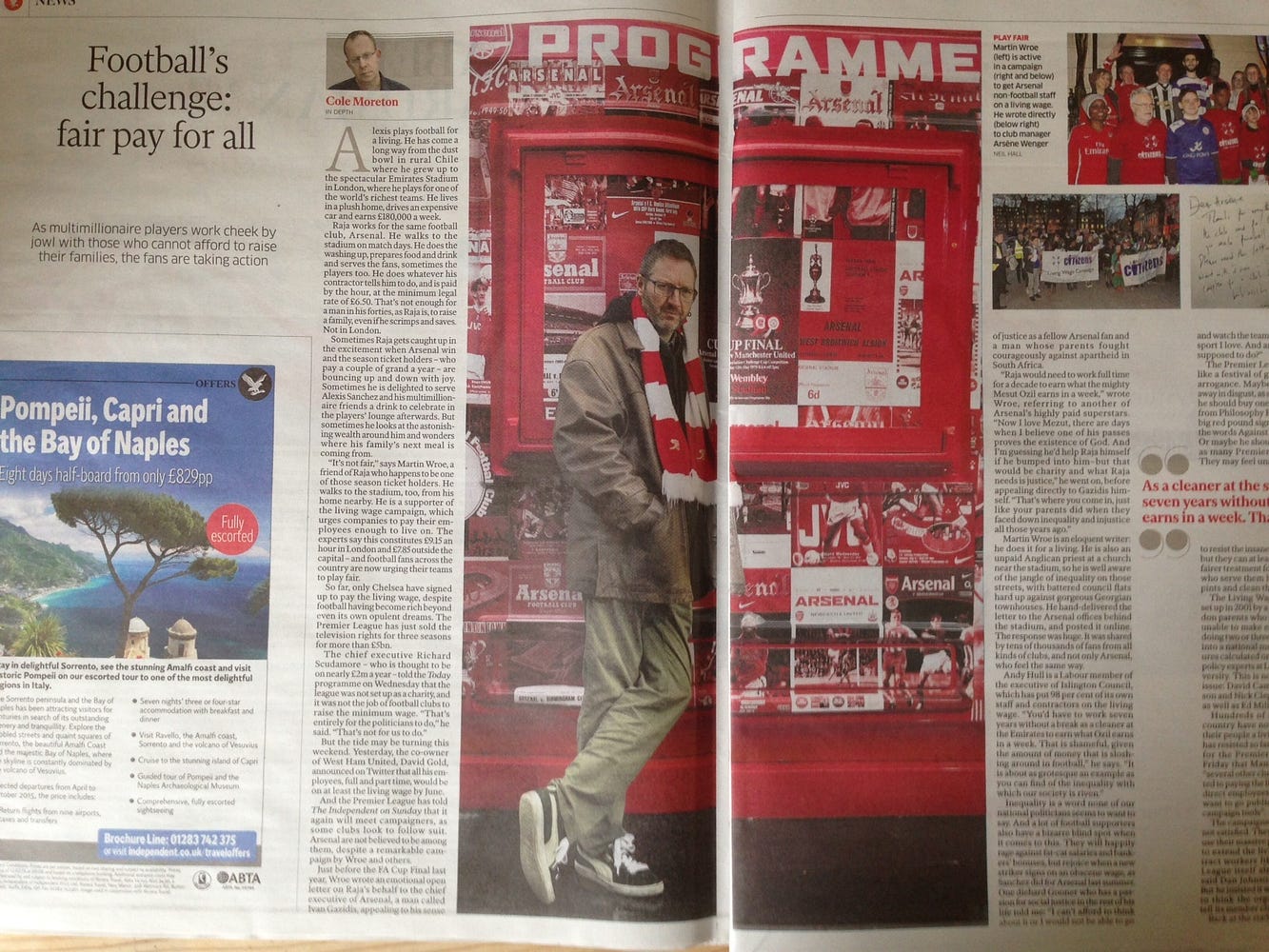
The press are picking up on it, not least because, as David Cameron puts it, the Living Wage is ‘an idea whose time has come’. City accountants like KPMG are backing it (‘extra wage costs are more than met by lowered recruitment churn and absenteeism, greater loyalty, and higher morale leading to better performance’) and London Mayor Boris Johnson has written to Mr Gazidis and every other Premiership boss asking for clubs to introduce it.
Until recently though, no football club had become a Living Wage Employer. Then the mighty Hearts of Midlothian in Scotland became the first. Followed by Luton Town, the first English club. And then, would you believe it, one of your own very good friends stepped in to show that even with all the exhausting complexity and politics of being a super-wealthy Premiership football club, it’s still possible to become a Living Wage Employer.
This friend is of course your fellow Russian billionaire Roman Abramovich, the owner of a club in south London called Chelsea and in December they became the first Premier League club to sign up to the Living Wage. As their Chairman Bruce Buck put it, ‘Quite simply it is the right thing to do.’
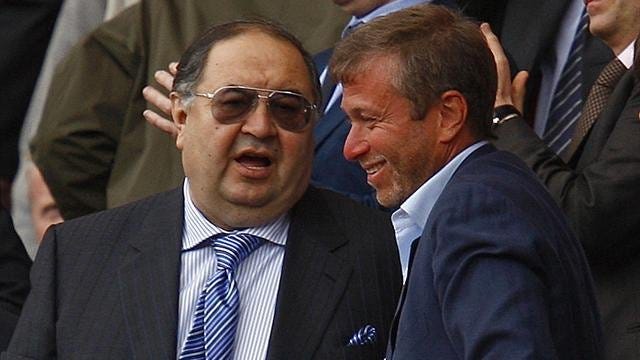
So now that you know what the Living Wage is, I thought you could talk to Roman Abramovich about how they’re introducing it at Chelsea — and then talk to Ivan Gazidis about getting Arsenal to follow suit.
I know you’ll see both the business and the moral case because, as you’ve said, ‘I have been very fortunate to be successful in business, and I believe that it is right that people who have this type of wealth should give something back into society.’
You also have a concern that people are paid decent wages. Only last month, when Russian Sports Minister Vitaly Mutko asked you for a loan to pay £3.9m in unpaid wages of Russia’s national coach Fabio Capello, you stumped up. ‘It is a disgrace,’ you said, ‘When a person who’s working for Russia doesn’t get paid for his labour.’
I feel certain you can persuade Ivan Gazidis and the other directors of Arsenal Football Club that it’s also a disgrace that such an exceedingly wealthy club believe they cannot pay everyone who works for them a living wage.
As you know Arsenal has a great record in the local community and backs many great local initiatives like the new Sports Centre. But on the Living Wage, it’s getting embarrassing. Last month, the Premier League invited a few of us from Citizens UK to a meeting, where they gave us free coffee and biscuits.
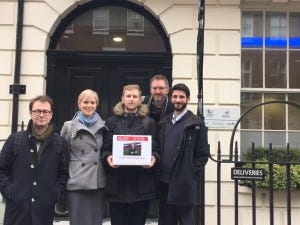
We suggested that after selling their TV rights for a record breaking £5.14 billion the clubs had no excuses left for not introducing the Living Wage. To back up our argument, Joel handed in his petition with 60,000 signatures — but the Premier League people told us they don’t have any power to advise clubs. They do what the clubs tell them to do.
One of our delegation was John Crowley — that’s him on the right above — who works at both Chelsea and Arsenal on match days and is saving up to pay for his degree. It’s absurd that in future Chelsea will pay him £9.15 an hour while he can expect nearly a third less doing the same work at Arsenal.
‘The Living Wage is about lifting families out of working poverty.’ says John. ‘I’m saving up to afford a law degree so I can achieve my dreams of being a lawyer and the minimum wage simply isn’t good enough especially when we know the Clubs can afford it.’
Over to you Mr Usmanov. You’re a passionate supporter of the club and

Thanks for letting me button hole you in Monaco the other night. Maybe you’re the man to persuade the club to do the right thing and start paying everyone a Living Wage.
Maybe that night in Monaco wasn’t the defeat it felt like.
best wishes
Martin Wroe
LIFE, DEATH, FOOTBALL & FRIENDSHIP — something else I wrote about football.

